*/
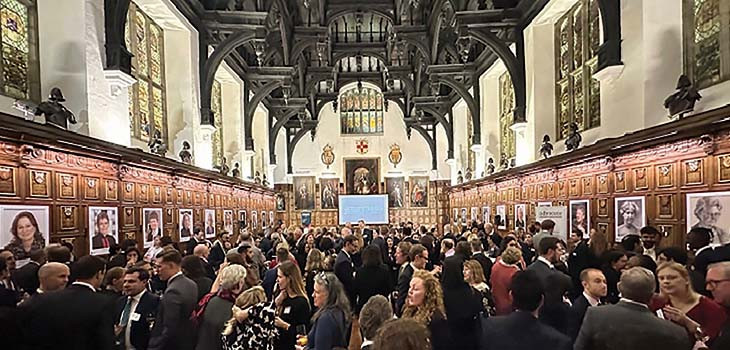
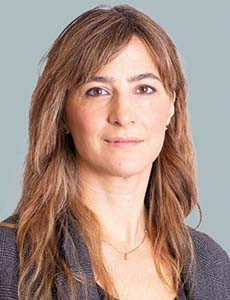
I started out in pupillage and early years of practice as a criminal defence practitioner. However, in the last few years I have forged a practice predominantly in international human rights law. A large part of my work involves the safety of journalists and the right to freedom of expression, as well as matters concerning arbitrary detention and torture.
I was first drawn to law, and human rights law in particular, because I saw it as a means to play some part in helping individuals who had been subjected to the most grave of abuses by government, and in doing so effect change, hopefully for the good. My practice is going in the direction I always hoped, and I feel very lucky in that respect.
International human rights law has always interested me and, to begin with, much of my work in this area was pro bono – not only because this was a way of gaining experience, but also because this is an area for which there is no legal aid. As a result, the majority of victims of human rights abuses rely on pro bono legal advice and representation.
Pro bono work is (and likely always will be) integral to my practice. But the reality is that we all need to earn a living and, as I am self-employed, I need to be selective in the cases I take on. Whether or not I can take on a particular pro bono instruction is very much dependent on capacity.
Working in international human rights law can be extremely rewarding but it is also challenging. It will often involve finding creative ways to persuade governments to do the right thing, or hold rights-violating governments to account, in circumstances where the domestic justice system has failed the individual, and there is no international court to go to. It is not straightforward, and often a marathon rather than a sprint. But there are days, like the day that Nazanin Zaghari-Ratcliffe was finally released and came home, that make it all worthwhile.
Pro bono is a great way to gain practical experience in an area of law that you have a keen interest in, and give a valuable contribution at the same time. It is also a great way to diversify your practice or to pursue an area that is seemingly unrelated to your principal practice area. If there is an issue that you feel passionately about, there is sure to be an organisation that would welcome pro bono assistance. For those interested in international human rights law, becoming a member of the Bar Human Rights Committee and getting involved in the projects they do is a good place to start.
The willingness of lawyers to work for free is, perhaps, one aspect of the profession that sets it apart from others. In the international space it has always been the case that many individuals are reliant on pro bono legal assistance. As legal aid shrinks domestically, pro bono work is becoming more important to ensuring that the most disadvantaged in our society have access to justice. But this is not something to be celebrated. It should not be the case that individuals’ access to justice is dependent on lawyers working pro bono. Pro bono will not fill the gap left by the reduction in legal aid. But there is still a tension between being willing to work for free, recognising the importance of pro bono work to ensuring access to justice, and not wanting to perpetuate a two-tier justice system where proper access to justice is only for those of financial means.
It means a lot to have one’s work recognised and I was very touched to receive this reward. Thank you.
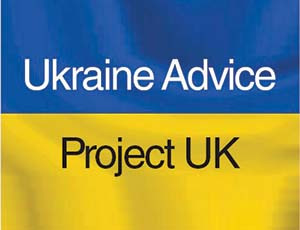
By the end of 2022, well over 200,000 Ukrainian citizens and their families had been granted visas allowing them to flee Putin’s invasion for the UK. Some are sponsored by family, while the majority have gone to live with host families up and down the country, from Benedict Cumberbatch to at least one High Court judge. The visa scheme is working well: there are precisely zero Ukrainian citizens taking small boats across the narrow sea from France, that last, desperate resort of refugees from Afghanistan, Syria and Iran.
When we began the Ukraine Advice Project (UAP) at the outset of the invasion, there were no special Ukraine visas. There were only the Immigration Rules: a slow, cumbersome process designed for spouses and children (no extended family need apply). The early weeks of the UAP initiative saw hundreds of UK immigration lawyers do their best to help Ukrainian refugees access such visas as might be available to them in order to flee the conflict. All too often, the advice was negative.
While the UK government never waived visa requirements entirely, as many wished and argued for, the special schemes that came on stream in the spring of 2022 meant that volunteers were increasingly able to give good news. Ukrainians already living here can sponsor a wide range of extended family members, while the Homes for Ukraine scheme caters for refugees with no prior ties to the UK.
The UAP has now assisted well over 3,000 cases (representing many more people) with information and advice about accessing these schemes. Its success depends primarily on the efforts of those pro bono volunteers, from the initial hard core recruited via Immigration Law Twitter to the solicitors of DLA Piper, Hogan Lovells, Eversheds Sutherlands and Clyde & Co who now deliver the core service. But other factors beyond our control have contributed: we take for granted, for example, the fact that we can receive and answer enquiries by email, with the assistance of Google Translate where necessary. Such a model would simply not have been possible for refugees fleeing the Yugoslav Wars in the early 1990s.
The work has been intellectually satisfying too. Volunteers had to quickly produce guidance notes on brand new, Ukraine-specific immigration regulations within hours of their promulgation. As the situation develops and matures, the nature of legal expertise required has evolved: refugees increasingly need information on housing, healthcare and education as they settle into life in the UK.
Thankfully, the UAP is far from the only game in town. Brilliant organisations such as the Work Rights Centre and JustRight Scotland have stepped in to assist as many refugees as possible with immigration and other advice.
The work of UAP volunteers has now been acknowledged with Pro Bono Initiative of the Year at Advocate’s Bar Pro Bono Awards, which I was privileged to collect on behalf of the collective on 2 November 2022. The four law firms who now administer the project day-to-day, led by Olivia Clark of DLA Piper, were recognised at the LawWorks Awards at the Law Society in December. It bears repeating that these awards are only ours in trust: the project accepted them on behalf of every lawyer who has given their time over the past year (many Counsel readers among them). We cannot thank them enough.
I am sure I speak for our hundreds of tireless volunteers when I close by saying that, while pro bono demands much; it gives back infinitely more.
Jennifer Blair, Ukraine Advice Project
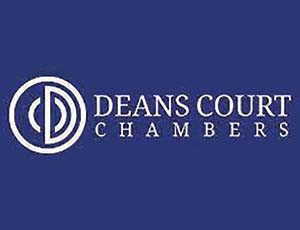
Deans Court’s involvement in pro bono activities stretches back some 40 years with the establishment of the Bar’s first Free Representation Scheme (NCFRS) which provided the template for the Bar Pro Bono Unit (now ‘Advocate’). In 1996, the barristers of the Northern Circuit won ‘The Lawyer Award for the Best Pro Bono Activity’ which is still proudly displayed in Chambers to this day.
We have always been proud supporters of Advocate and the wider pro bono network, with a firm belief that Advocate’s core values of ‘serving the public’ as well as ‘compassion’ and ‘providing legal support to those who cannot afford it’ align with our own.
Pro bono cases are an opportunity to give back to the local community we serve – and this is an ethos embedded into our culture and one we strive to champion. It was the catalyst for us becoming one of the few Northern sets to have three members complete the recent 25 for 25 Pro Bono Challenge to celebrate Advocate’s 25-year anniversary. Members are encouraged to take part in pro bono as much as they are able and this creates solid foundations for future career development.
As successive governments have restricted access to justice through funding ‘reforms’, pro bono work has become even more important. Many barristers and solicitors battle against this tide on a daily basis, but it’s still rewarding to add something back to society, particularly for those people who are most in need. The vast amount of help and support that pro bono lawyers and organisations provide in a challenging market may be the only legal support that the most vulnerable in society receive.
This is much more than just a chance at career development; assisting those who would otherwise be unable to access legal support is an opportunity to offer a possibly life changing service to clients in need. The best advice we could give to anyone considering taking on pro bono work is, ‘Try it!’ It also provides an opportunity to gain experience in new areas of law.
Last year Chambers was honoured that Michael Hayton KC, Head of Chambers, was appointed as a trustee on the board of Advocate. He later attended the Bar Pro Bono Awards ceremony in Middle Temple and collected the award of Pro Bono Chambers of the Year. He commented: ‘It was wonderful that a Northern Circuit set was so honoured and particularly pleasing from my perspective that it was Deans Court Chambers that was recognised. This award is something of which we are all justifiably proud.’
Alex Jenkinson, Deans Court Chambers
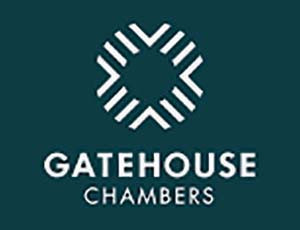
We were thrilled to win the Pro Bono Chambers of the Year Award. Pro bono work plays a vital role in the legal sector and we recognise its importance in giving people crucial access to justice.
Our Heads of Chambers and CEO lead our pro bono efforts by example, but this is carried through by many colleagues: it is engrained in our culture and we are very proud of the work that everyone does. Gatehouse Chambers inspires colleagues at all levels and within every facet of the organisation to get involved with pro bono. Our barristers and the practice team give time to diverse, wide-ranging causes.
Barristers are encouraged to undertake work from an early stage in their careers, and we incorporate this into our internal training programme and practice development meetings.
Our members provide pro bono advice and advocacy through the Advocate scheme and a plethora of other schemes. Cameron Stocks, for example, was part of the first cohort to receive the CLIPS Pro Bono Champion Award in 2021 – an award given to advocates who have volunteered the greatest number of times. Members also volunteer as case reviewers for Advocate and have come forward as mentors for less-experienced colleagues including those in other chambers.
There are many other pro bono superstars at Gatehouse Chambers, and working alongside them is a privilege. Catherine Piercy KC, one of our leading construction and insurance specialists, has been a dedicated Pro Bono Champion for many years. Catherine spearheaded our 25 for 25 Pro Bono Challenge efforts and has shown tireless commitment to the scheme, encouraging over 20 colleagues to take part, ranging from silks to juniors. Likewise, it was fantastic to see Joshua Griffin awarded for his efforts by taking home the John Collins Pro Bono Excellence Award this year.
We would encourage any barrister thinking about pro bono work to do it; to help those in need and to reap the rewards on a personal and professional level. Providing free advice in the post-pandemic climate is more vital than ever. Gatehouse Chambers will continue to encourage more members to take on pro bono work in 2023 and beyond.
Ashley Allen, Gatehouse Chambers


I started out in pupillage and early years of practice as a criminal defence practitioner. However, in the last few years I have forged a practice predominantly in international human rights law. A large part of my work involves the safety of journalists and the right to freedom of expression, as well as matters concerning arbitrary detention and torture.
I was first drawn to law, and human rights law in particular, because I saw it as a means to play some part in helping individuals who had been subjected to the most grave of abuses by government, and in doing so effect change, hopefully for the good. My practice is going in the direction I always hoped, and I feel very lucky in that respect.
International human rights law has always interested me and, to begin with, much of my work in this area was pro bono – not only because this was a way of gaining experience, but also because this is an area for which there is no legal aid. As a result, the majority of victims of human rights abuses rely on pro bono legal advice and representation.
Pro bono work is (and likely always will be) integral to my practice. But the reality is that we all need to earn a living and, as I am self-employed, I need to be selective in the cases I take on. Whether or not I can take on a particular pro bono instruction is very much dependent on capacity.
Working in international human rights law can be extremely rewarding but it is also challenging. It will often involve finding creative ways to persuade governments to do the right thing, or hold rights-violating governments to account, in circumstances where the domestic justice system has failed the individual, and there is no international court to go to. It is not straightforward, and often a marathon rather than a sprint. But there are days, like the day that Nazanin Zaghari-Ratcliffe was finally released and came home, that make it all worthwhile.
Pro bono is a great way to gain practical experience in an area of law that you have a keen interest in, and give a valuable contribution at the same time. It is also a great way to diversify your practice or to pursue an area that is seemingly unrelated to your principal practice area. If there is an issue that you feel passionately about, there is sure to be an organisation that would welcome pro bono assistance. For those interested in international human rights law, becoming a member of the Bar Human Rights Committee and getting involved in the projects they do is a good place to start.
The willingness of lawyers to work for free is, perhaps, one aspect of the profession that sets it apart from others. In the international space it has always been the case that many individuals are reliant on pro bono legal assistance. As legal aid shrinks domestically, pro bono work is becoming more important to ensuring that the most disadvantaged in our society have access to justice. But this is not something to be celebrated. It should not be the case that individuals’ access to justice is dependent on lawyers working pro bono. Pro bono will not fill the gap left by the reduction in legal aid. But there is still a tension between being willing to work for free, recognising the importance of pro bono work to ensuring access to justice, and not wanting to perpetuate a two-tier justice system where proper access to justice is only for those of financial means.
It means a lot to have one’s work recognised and I was very touched to receive this reward. Thank you.

By the end of 2022, well over 200,000 Ukrainian citizens and their families had been granted visas allowing them to flee Putin’s invasion for the UK. Some are sponsored by family, while the majority have gone to live with host families up and down the country, from Benedict Cumberbatch to at least one High Court judge. The visa scheme is working well: there are precisely zero Ukrainian citizens taking small boats across the narrow sea from France, that last, desperate resort of refugees from Afghanistan, Syria and Iran.
When we began the Ukraine Advice Project (UAP) at the outset of the invasion, there were no special Ukraine visas. There were only the Immigration Rules: a slow, cumbersome process designed for spouses and children (no extended family need apply). The early weeks of the UAP initiative saw hundreds of UK immigration lawyers do their best to help Ukrainian refugees access such visas as might be available to them in order to flee the conflict. All too often, the advice was negative.
While the UK government never waived visa requirements entirely, as many wished and argued for, the special schemes that came on stream in the spring of 2022 meant that volunteers were increasingly able to give good news. Ukrainians already living here can sponsor a wide range of extended family members, while the Homes for Ukraine scheme caters for refugees with no prior ties to the UK.
The UAP has now assisted well over 3,000 cases (representing many more people) with information and advice about accessing these schemes. Its success depends primarily on the efforts of those pro bono volunteers, from the initial hard core recruited via Immigration Law Twitter to the solicitors of DLA Piper, Hogan Lovells, Eversheds Sutherlands and Clyde & Co who now deliver the core service. But other factors beyond our control have contributed: we take for granted, for example, the fact that we can receive and answer enquiries by email, with the assistance of Google Translate where necessary. Such a model would simply not have been possible for refugees fleeing the Yugoslav Wars in the early 1990s.
The work has been intellectually satisfying too. Volunteers had to quickly produce guidance notes on brand new, Ukraine-specific immigration regulations within hours of their promulgation. As the situation develops and matures, the nature of legal expertise required has evolved: refugees increasingly need information on housing, healthcare and education as they settle into life in the UK.
Thankfully, the UAP is far from the only game in town. Brilliant organisations such as the Work Rights Centre and JustRight Scotland have stepped in to assist as many refugees as possible with immigration and other advice.
The work of UAP volunteers has now been acknowledged with Pro Bono Initiative of the Year at Advocate’s Bar Pro Bono Awards, which I was privileged to collect on behalf of the collective on 2 November 2022. The four law firms who now administer the project day-to-day, led by Olivia Clark of DLA Piper, were recognised at the LawWorks Awards at the Law Society in December. It bears repeating that these awards are only ours in trust: the project accepted them on behalf of every lawyer who has given their time over the past year (many Counsel readers among them). We cannot thank them enough.
I am sure I speak for our hundreds of tireless volunteers when I close by saying that, while pro bono demands much; it gives back infinitely more.
Jennifer Blair, Ukraine Advice Project

Deans Court’s involvement in pro bono activities stretches back some 40 years with the establishment of the Bar’s first Free Representation Scheme (NCFRS) which provided the template for the Bar Pro Bono Unit (now ‘Advocate’). In 1996, the barristers of the Northern Circuit won ‘The Lawyer Award for the Best Pro Bono Activity’ which is still proudly displayed in Chambers to this day.
We have always been proud supporters of Advocate and the wider pro bono network, with a firm belief that Advocate’s core values of ‘serving the public’ as well as ‘compassion’ and ‘providing legal support to those who cannot afford it’ align with our own.
Pro bono cases are an opportunity to give back to the local community we serve – and this is an ethos embedded into our culture and one we strive to champion. It was the catalyst for us becoming one of the few Northern sets to have three members complete the recent 25 for 25 Pro Bono Challenge to celebrate Advocate’s 25-year anniversary. Members are encouraged to take part in pro bono as much as they are able and this creates solid foundations for future career development.
As successive governments have restricted access to justice through funding ‘reforms’, pro bono work has become even more important. Many barristers and solicitors battle against this tide on a daily basis, but it’s still rewarding to add something back to society, particularly for those people who are most in need. The vast amount of help and support that pro bono lawyers and organisations provide in a challenging market may be the only legal support that the most vulnerable in society receive.
This is much more than just a chance at career development; assisting those who would otherwise be unable to access legal support is an opportunity to offer a possibly life changing service to clients in need. The best advice we could give to anyone considering taking on pro bono work is, ‘Try it!’ It also provides an opportunity to gain experience in new areas of law.
Last year Chambers was honoured that Michael Hayton KC, Head of Chambers, was appointed as a trustee on the board of Advocate. He later attended the Bar Pro Bono Awards ceremony in Middle Temple and collected the award of Pro Bono Chambers of the Year. He commented: ‘It was wonderful that a Northern Circuit set was so honoured and particularly pleasing from my perspective that it was Deans Court Chambers that was recognised. This award is something of which we are all justifiably proud.’
Alex Jenkinson, Deans Court Chambers

We were thrilled to win the Pro Bono Chambers of the Year Award. Pro bono work plays a vital role in the legal sector and we recognise its importance in giving people crucial access to justice.
Our Heads of Chambers and CEO lead our pro bono efforts by example, but this is carried through by many colleagues: it is engrained in our culture and we are very proud of the work that everyone does. Gatehouse Chambers inspires colleagues at all levels and within every facet of the organisation to get involved with pro bono. Our barristers and the practice team give time to diverse, wide-ranging causes.
Barristers are encouraged to undertake work from an early stage in their careers, and we incorporate this into our internal training programme and practice development meetings.
Our members provide pro bono advice and advocacy through the Advocate scheme and a plethora of other schemes. Cameron Stocks, for example, was part of the first cohort to receive the CLIPS Pro Bono Champion Award in 2021 – an award given to advocates who have volunteered the greatest number of times. Members also volunteer as case reviewers for Advocate and have come forward as mentors for less-experienced colleagues including those in other chambers.
There are many other pro bono superstars at Gatehouse Chambers, and working alongside them is a privilege. Catherine Piercy KC, one of our leading construction and insurance specialists, has been a dedicated Pro Bono Champion for many years. Catherine spearheaded our 25 for 25 Pro Bono Challenge efforts and has shown tireless commitment to the scheme, encouraging over 20 colleagues to take part, ranging from silks to juniors. Likewise, it was fantastic to see Joshua Griffin awarded for his efforts by taking home the John Collins Pro Bono Excellence Award this year.
We would encourage any barrister thinking about pro bono work to do it; to help those in need and to reap the rewards on a personal and professional level. Providing free advice in the post-pandemic climate is more vital than ever. Gatehouse Chambers will continue to encourage more members to take on pro bono work in 2023 and beyond.
Ashley Allen, Gatehouse Chambers


The Bar Council is ready to support a turn to the efficiencies that will make a difference
By Louise Crush of Westgate Wealth Management
Marie Law, Director of Toxicology at AlphaBiolabs, examines the latest ONS data on drug misuse and its implications for toxicology testing in family law cases
An interview with Rob Wagg, CEO of New Park Court Chambers
What meaningful steps can you take in 2026 to advance your legal career? asks Thomas Cowan of St Pauls Chambers
Marie Law, Director of Toxicology at AlphaBiolabs, explains why drugs may appear in test results, despite the donor denying use of them
Ever wondered what a pupillage is like at the CPS? This Q and A provides an insight into the training, experience and next steps
The appointments of 96 new King’s Counsel (also known as silk) are announced today
Ready for the new way to do tax returns? David Southern KC continues his series explaining the impact on barristers. In part 2, a worked example shows the specific practicalities of adapting to the new system
Resolution of the criminal justice crisis does not lie in reheating old ideas that have been roundly rejected before, say Ed Vickers KC, Faras Baloch and Katie Bacon
With pupillage application season under way, Laura Wright reflects on her route to ‘tech barrister’ and offers advice for those aiming at a career at the Bar